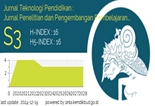The Influence of Using Tiktok Application on the Establishment of Student Entrepreneurial Spirit
Abstract
TikTok is the most popular social media in Indonesia with an average usage duration of more than 2 hours per day with a percentage of 47.4% from Indonesian population. TikTok initially only functioned as an entertainment media by displaying various short videos. However, along with its development, TikTok now opens up great opportunities for business owners to be able to expand their marketing through video advertisements. This study aims to determine the influence of using TikTok on the establishment of student Entrepreneurial Spirit of Social Science Education students. The approach used is a quantitative approach with a survey method. This study involved 162 respondents as a sample using the Proportionate Stratified Random Sampling technique. The data collection technique used in this study was a questionnaire with a Likert scale. Hypothesis testing in this study using simple linear regression analysis. The results showed a sig value. 0.008 <0.05 and obtained a t-count value of 2.685> t-table 1.975, which means that there is a positive influence between the two variables.
Keywords
Full Text:
PDFReferences
Abbas, D. (2018). Pengaruh Modal Usaha, Orientasi Pasar, dan Orientasi Kewirausahaan terhadap Kinerja UKM Kota Makassar. Jurnal Manajemen, Ide, Inspirasi (MINDS), 5(1).
Adnyana, P. (2016). Pengaruh Pendidikan Kewirausahaan, Self Efficacy, dan Locus of Control pada Niat Berwirausaha. E-Jurnal Manajemen Unud, Vol.5 No.2. https://ojs.unud.ac.id/index.php/Manajemen/article/viewFile/16350/12318
Ajzen, I. (1991). Theory of Planned Behaviour “Organisazional Behaviour and Human Decision.” 50(2), 179–211.
Batoebara, M. U. (2020). Aplikasi Tik-Tok Seru-Seruan Atau Kebodohan. Network Media, 3(2), 59–65. https://doi.org/10.46576/jnm.v3i2.849
Creswell, J. W. (2012). Research Design: Pendekatan Metode Kualitatif, Kuantitatif, dan Campuran. Pustaka Belajar.
Febrianurdi, A. B., & Kurniawan, J. E. (2017). Hubungan Motivasi Berprestasi dengan Minat Berwirausaha Mahasiswa Psikologi. Psychopreneur Journal, 1(1), 76–84. https://doi.org/10.37715/psy.v1i1.360
Frisnawati, A. (2012). Hubungan Antara Intensitas Menonton Reality Show dengan Kecenderungan Perilaku Prososial pada Remaja. Jurnal Empathy, 1(2).
Ghozali, I. (2018). Aplikasi Analisis Multivariate dengan Program Aplikasi IBM SPSS (9th ed.). Badan Penerbit Universitas Diponegoro.
Keller, P. K. dan K. L. (2016). Marketing Management (15th editi). Pearson Education.
Mahardika, S. V., Ma’una, I. I., Islamiyah, Z., & Nurjannah, I. (2021). Faktor-Faktor Penyebab Tingginya Minat Generasi Post-Millenial Indonesia Terhadap Penggunaan Aplikasi Tik-Tok. Social Science Educational Research, 2(1), 40. https://ejournal.unesa.ac.id/index.php/sosearch/article/view/42972
Manda, A., & Madjid, I. (2012). Analisis Pengaruh Sikap, Norma Subyektif dan Efikasi Diri terhadap Intensi Berwirausaha pada Mahasiswa Fakultas Ekonomi Universitas Syiah Kuala. Universitas Negeri Semarang.
Mutia, A. (2022). Warga RI Paling Banyak Habiskan Waktu Bermedia Sosial di WhatsApp dan TikTok. Databooks.Katadata.Co.Id. https://databoks.katadata.co.id/datapublish/2022/09/15/warga-ri-paling-banyak-habiskan-waktu-bermedia-sosial-di-whatsapp-dan-tiktok
Purbohastuti, A. W. (2017). Efektivitas Media Sosial sebagai Media Promosi. Ekonomika, 12(2), 212–231.
Sugiyono. (2008). Metode Penelitian Pendidikan: Pendekatan Kuantitatif, Kualitatif, dan R&D. Alfabeta.
Watie, E. D. S. (2016). Komunikasi dan Media Sosial (Communications and Social Media). Jurnal The Messenger, 3(2), 69. https://doi.org/10.26623/themessenger.v3i2.270
DOI: https://doi.org/10.33394/jtp.v9i1.10065
Refbacks
- There are currently no refbacks.
Copyright (c) 2024 Kharisma Harum Sari, Acep Supriadi, Muhammad Arief Rakhman

This work is licensed under a Creative Commons Attribution-ShareAlike 4.0 International License.
This Journal has been Indexed by:
Jurnal Teknologi Pendidikan
ISSN: 2656-1417 (Online)
ISSN: 2503-0620 (Print)
Published by Program Studi Teknologi Pendidikan, FIPP
Universitas Pendidikan Mandalika
Email: [email protected]

This work is licensed under a Creative Commons Attribution-ShareAlike 4.0 International License.















.png)






